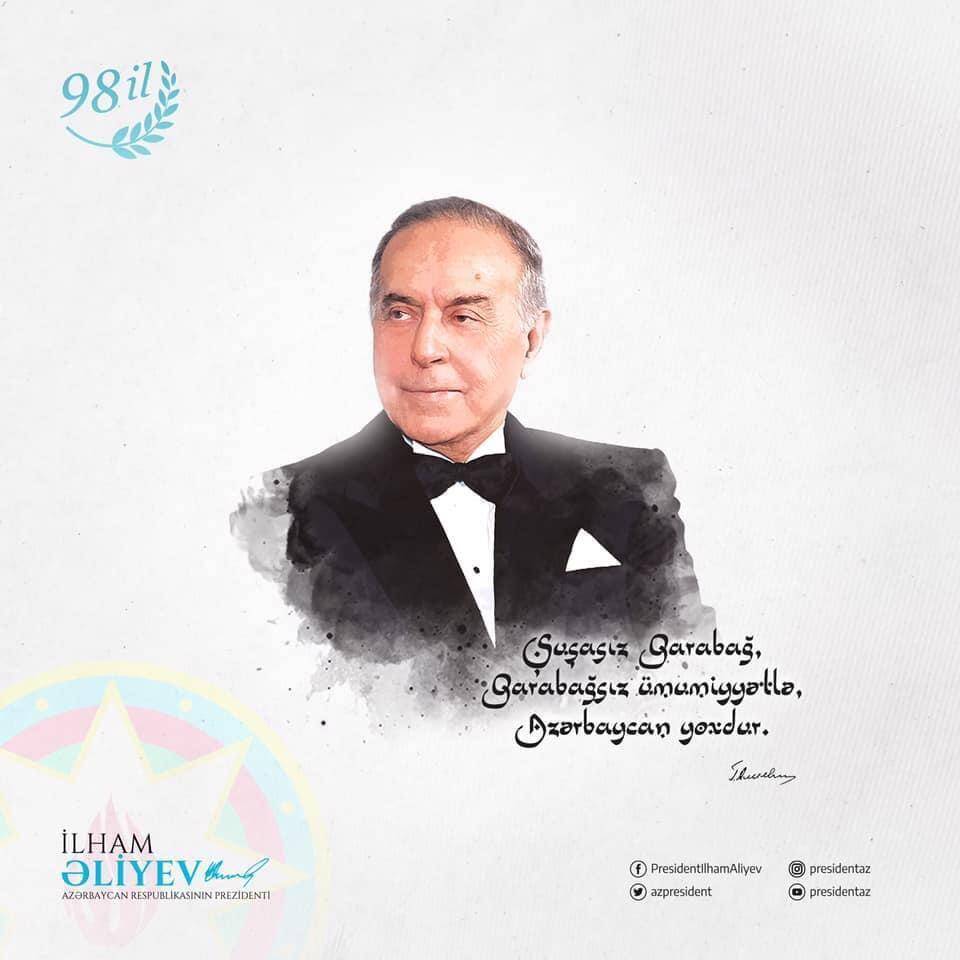Some leaders remain popular in history, but some leaders create history.
Heydar Aliyev, as an architect of modern Azerbaijan, became a true legend of his time. History remembers him as a unique leader, a powerful head of state, a selfless man, and a legendary figure able to carry the difficult task of state-building on his shoulders.
Aliyev rendered great services to his nation during his tenure as the first deputy chairman of the Cabinet of what was then the Soviet Union (USSR).
After the collapse of the USSR, his efforts enabled the young state to stand on its feet and enter into the 21st century as an independent country.
Even though Azerbaijan declared its independence in 1991, political crisis, the emergence of separatist tendencies in different regions, and the severe socioeconomic situation put the country face-to-face with a threat of civil war. Things were further exacerbated by Armenia’s aggression and occupation of Azerbaijan’s lands.
In such a fateful moment, the Azerbaijani people trusted their future to Aliyev, who served as the country’s president between 1993 and 2003. Thanks to his continued efforts, far-sighted and wise diplomacy to resolve the Nagorno-Karabakh conflict, the cease-fire agreement signed in 1994 prevented the occupation of other territories and the loss of Azerbaijan’s independence.
Aliyev also laid the foundations of a modern army. He is credited with restoring and enriching the statehood traditions of Azerbaijan, and with strengthening the country’s economy.
To turn a young independent Azerbaijan into a modern, powerful state with sustainable economic development, Aliyev formulated an oil strategy, which would lie at the heart of fundamental transformation of the future political and economic reforms. The strategy ensured the flow of foreign investments into the country that propelled it into a new era of development.
Under his dynamic leadership, the agreement to develop the Azeri and Chirag fields and the deep water portion of the Gunashli field in the Azerbaijan sector of the Caspian Sea was signed on Sept. 20, 1994. Due to its political, economic, and strategic importance, the agreement was dubbed “the contract of the century.”
Subsequently the opening of the Baku-Novorossiysk and Baku-Supsa pipelines in 1996 and 1999, the signing of an agreement on construction of the Baku-Tbilisi-Jeyhan main export oil pipeline, and the diversification of export routes were achieved to export Azerbaijani oil to the world.
The Baku-Tbilisi-Jeyhan main export oil pipeline is considered one of the greatest successes of Aliyev’s oil strategy. He also took the initiative to construct the Baku-Tbilisi-Erzurum gas pipeline to ensure the export of Azerbaijani gas to the West.
The late Azerbaijani leader also focused on the development of international and transit corridors and roads.
Aliyev is credited with restoring and enriching the statehood traditions of Azerbaijan.
Shahin Abdullayev
The international conference on the reconstruction of the Silk Road was organized successfully in Baku in 1998. Azerbaijan signed several multilateral agreements to boost its transport sector, which helped the country’s economy.
Projects initiated by Aliyev are now being implemented by President Ilham Aliyev. In 2018 the Trans-Adriatic Pipeline (TAP) and the Trans-Anatolian Pipeline (TANAP) completed their connection with the final golden weld. TAP will transport natural gas from the giant Shah Deniz II field in Azerbaijan to Europe. The 878 km pipeline will connect with TANAP at the Turkish-Greek border at Kipoi, across Greece and Albania and the Adriatic Sea, before coming ashore in Southern Italy.
During Heydar Aliyev’s presidency, the nation’s foreign policy was revisited and transformed into a balanced one. Bilateral relations between Azerbaijan and other countries, as well as cooperation with international organizations, particularly the Organization of Islamic Cooperation and the Arab world, were consolidated. His visit to Saudi Arabia in 1994 opened new opportunities for the development of bilateral relations and the two countries signed their first agreement on the economy, trade, investment, technology, culture, youth, and sports.
Aliyev’s Philosophy was characterized by wide expansions of all forms and means of national self-expression of the people, consolidation of the national dignity, and realization of rapid development. Aliyev’s philosophy of “Azerbaijanism” determined a respectable place for the country in the comity of nations.
His ideas and wise policies were successfully continued by President Ilham Aliyev. Under this far-sighted policy, Azerbaijan is rapidly developing and building its reputation. Azerbaijani people commemorate the anniversary of their great leader’s birth on May 10 every year to express their love and respect.
• Shahin Abdullayev is Azerbaijan’s ambassador to Saudi Arabia.












